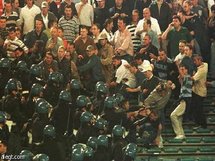Rio police on alert after deadly drug violence
AFP
RIO DE JANEIRO- Brazil deployed an extra 4,500 police Sunday as deadly clashes with drug traffickers brought down a police helicopter and left 17 people dead over the weekend in 2016 Olympics host city Rio.
Jose Mariano Beltrame, Rio de Janeiro state's security chief, told reporters reinforcements were sent in from outlying areas in an effort to calm tensions in the city's sprawling, impoverished hillside favelas.

Some 6,000 people were murdered here in 2008 alone.
Saturday marked a bloody first as two police were killed when drug dealers shot down their helicopter in the Macacos slum near Maracana stadium, where the 2014 soccer World Cup games and the 2016 Olympics will kick off.
The aircraft exploded shortly after landing and only two policemen -- including the pilot -- were able to get out in time. The other two passengers burnt to death.
After the helicopter crashed, a new gun battle erupted between gangs and more than 100 police, backed by Special Police Operations Battalion (BOPE) troops and an armored vehicle.
Ten suspected criminals were killed in the shootout, a police spokesman said.
"I have never heard so many gunshots in my life," a 15-year-old girl who lives in Morro dos Macacos told the G1 website of the Globo media network.
Bus driver Fabio Nascimento said 15 masked men armed with guns and pistols had ordered him to step out of his vehicle and evacuate passengers, declaring: "Get out, get out, we are going to set it on fire!"
More violence erupted later Sunday in the Jacarezinho favela, where two suspected drug traffickers were killed during a shootout with police, police spokesman Oderley Santos said.
Three bodies of suspected criminals were also found Sunday in the Sao Joao favela, he added.
The president of the Organization of Lawyers of Brazil (OAB) in Rio denounced the parallel network of power in the city where, in some areas, gangs hold more control than authorities.
Saturday's dramatic clashes erupted as gangs in the neighboring "Morro do Sao Jao" favela tried to invade Morro dos Macacos and seize control there, officials said.
Civilian and military police were on alert Sunday and those who were due to be off were called in, Beltrame said.
Justice Minister Tarso Genro offered Rio's authorities an elite army unit for emergency situations, but so far Rio state Governor Sergio Cabral has said no to that.
Major police operations regularly take place in the favelas, home to drug gangs and a third of the city's population -- two million people.
Brazil urgently needs to find new investment and to streamline its bulky bureaucracy as it prepares to host the world's two biggest sporting events: the 2016 Olympics and 2014 soccer World Cup, analysts say.
After Rio de Janeiro was chosen as the host of the 2016 Olympiad, the government promised new investment in a slew of new projects. Public safety and public transport are top priorities that will require major outlays.
Even before its Olympics challenge, the South American giant will have to remodel and build new stadiums in 12 cities so that they could receive participants of the 2014 soccer World Cup.
To organize both events, the country will have to spend between 17.6 billion and 30 billion dollars, according to professor Francisco Carlos of the Foundation Institute of Economic Research.
---------------------------------------------------------------------------------------------------------------------------------